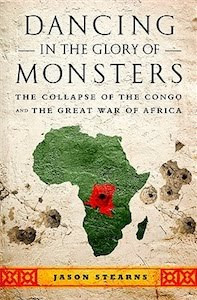 Dancing in the Glory of Monsters. The Collapse of Congo and the Great War of Africa, Jason K. Stearns (Public Affairs: 380pp, 2011)
Dancing in the Glory of Monsters. The Collapse of Congo and the Great War of Africa, Jason K. Stearns (Public Affairs: 380pp, 2011)How best to make sense of Congo’s enduring crisis, a tale of daunting political complexity and extraordinary cruelty? Many writers have tried, for no other African country captivates the western literary imagination as much as Congo. This fascination long precedes Joseph Conrad, who indelibly described King Leopold’s Congo Free State over a century ago. But faithful subjects do not good art make, and most western writing on Congo is unreadable or, at best, unbearable.
The sheer complexity of Congo’s dramatic history is one contributing factor behind all the dreadful writing. Many an author sacrifices compelling narrative for rigorous scholarship, resulting in a turgid swamp of acronyms for all the armed groups, the Security Council Resolutions and the doomed peace deals. Epic chronicles like Africa’s World War (Gérard Prunier) may be valuable to scholars but are so microscopically detailed as to be opaque to non-specialists.
Adventure writing, the other main genre of Congo literature, is equally abundant and can carry a plot, but the stories glorify the exploits of the author and ignore the Congolese. “Watch me as I commune with gentle pygmies, wrestle crocodiles on the great Congo River, escape beheading by a throng of stoned child soldiers”— setting the bar for unbearable reading. Common to both schools is the absence of Congolese voice; for both, Congo is a neutral, muted stage for the author’s performance (scholarship, “survival”). Faced with such output, one thinks, the trampling of Congo just goes on and on.
Jason Stearns shares this lament. A recognized scholar and field analyst with years of human rights reporting from the country’s most remote zones of conflict , he tackles Congo’s complexity head-on, unpeeling the onion of its myriad wars within wars. But Stearns is after larger game than demystifying Congo’s “inscrutable chaos” for a western audience. By capturing the political rationales and individual motives as voiced by key players themselves, abhorrent though they may be, he personalizes Congo’s tumultuous ups and downs. Taming this wooly complexity with character-driven narrative and firsthand experience, the book is ultimately a challenge to the reigning stereotype of Congo as an inchoate mêlée of raw power devouring the meek and innocent. Recalling the reductive lens that framed colonialism’s “civilizing mission” (humanity over barbarism, reason vs. unreason), it’s not hard to discern an unbroken line between western perceptions of Congo in Conrad’s time and our own elitist, arguably racist, comprehension today.
Continue reading this review here.